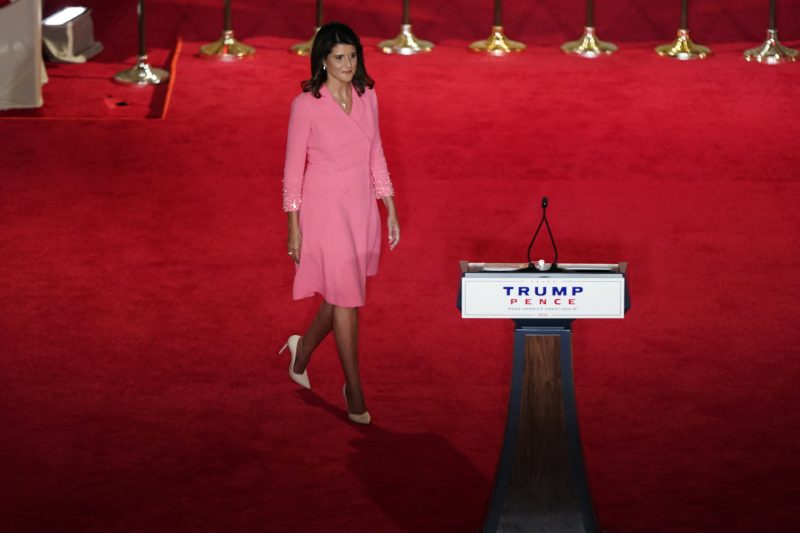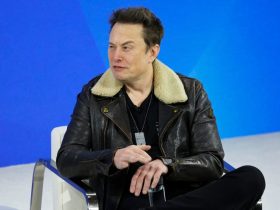This post has been updated.
Three months after former president Donald Trump technically launched the 2024 presidential race, the contest is actually beginning in earnest.
Nikki Haley, a former South Carolina governor and United Nations ambassador under Trump, became the second official, major GOP candidate on Tuesday, announcing her run in a video and promising an in-person announcement on Wednesday. (As yet, no major Democrats have declared their intentions, including President Biden.)
But how does Haley fit into the Republican field? It’s one of the bigger wild cards in a competition that for now is mostly focused on Trump and the potential candidacy of Florida Gov. Ron DeSantis.
Haley is nothing if not an enigma. On one hand, she made a name for herself by repeatedly breaking with her party’s orthodoxy, reaping the bipartisan benefits that come with it and becoming arguably the most popular official in the Trump administration. (She did not follow Trump’s line on Charlottesville, for example, and when some in the White House sought to fault her for announcing sanctions on Russia, accusing her of getting confused about the administration’s position, she responded succinctly, “With all due respect, I don’t get confused.”)
On the other hand, the current state of the Republican Party seems to make such a posture untenable, and Haley has repeatedly bowed to that reality — albeit haltingly.
Get excited! Time for a new generation.
Let’s do this! pic.twitter.com/BD5k4WY1CP
— Nikki Haley (@NikkiHaley) February 14, 2023
Haley’s big entrance onto the national political scene came after a mass killing at a historical Black church in Charleston, S.C., in 2015. When a movement grew to remove the Confederate flag from the statehouse grounds, she jumped on board. The result: Something that two-thirds of the state had opposed the year before passed easily in the GOP-controlled state legislature. Soon, Haley was leaving office with an image that was 2-to-1 positive in her home state.
Haley departed as governor to become Trump’s ambassador to the United Nations. And, in that role, she could craft a uniquely independent — and popular — brand. A 2018 poll showed she was the rare Trump administration official who was well-regarded on both sides of the political spectrum. Thanks to Democrats’ approval of her job performance by 55 percent to 23 percent, her overall approval split was 63-17 — better even than that of Defense Secretary Jim Mattis.
But that role, which isn’t always considered a Cabinet position but was for Haley, also allowed Haley to pick her spots. She largely avoided the glaring spotlight that followed many top Trump administration officials and congressional Republicans. And even as that tenure set Haley up for a presidential run, she has struggled to capitalize on her stature, offering conflicting signals about her path forward.
There is, of course, Haley’s remarkable flip-flop on Trump after Jan. 6, 2021. In a lengthy profile by Politico’s Tim Alberta, she essentially declared in the insurrection’s aftermath that Trump was done and that the GOP should be done with him. But then she rather swiftly realigned herself with the former president. She even said at one point in 2021 that she wouldn’t run in 2024 against him — a pledge that has obviously gone by the wayside.
Many Republicans offered some version of this flip-flop in the weeks and months after Jan. 6 (see: McCarthy, Kevin). But Haley stuck out for her decision to jump so emphatically on the turn-the-page-on-Trump train, only to hop off when it became clear the party was headed in a different direction.
Haley’s announcement video makes no direct mention of Trump, though it does argue for a “new generation” and points to the fact that Republicans have lost the popular vote in seven of the last eight elections. Two of those popular-vote losses were suffered by Trump. It otherwise focuses on her personal backstory, including being raised as an Indian American and her record in South Carolina.
Perhaps the more overlooked evolution in Haley’s political career involves comments she made at the height of her popularity in 2018. Speaking to conservative students at a Turning Point USA conference, she made an impassioned case against Republicans embracing an “own the libs” mentality. It seemed a remarkable statement of intent, given how that ethos had subsumed the party and embodied Trump’s entire approach to politics.
“I know that it’s fun and that it can feel good, but step back and think about what you’re accomplishing when you do this — are you persuading anyone? Who are you persuading?” Haley said, echoing past comments emphasizing civility and decrying “the siren call of the angriest voices.” She added: “We’ve all been guilty of it at some point or another, but this kind of speech isn’t leadership; it’s the exact opposite.”
By early 2020, though, the same Nikki Haley accused Democrats of “mourning” the death of Iran’s Quds Force commander, Maj. Gen. Qasem Soleimani.
It’s almost a cliche at this point to note such conflicting messages from Haley (the headline of that 2021 Politico profile was, appropriately, “Nikki Haley’s time for choosing”). But running for president means presenting your case to voters on an extremely regular basis and expounding on your vision at length in a way Haley has yet to do — even in two campaigns for governor.
Right now, the easy and probably the smartest call might be to run her own race and avoid mixing it up with Trump and DeSantis. Haley has shown an ability to drive a more high-minded and aspirational message — such as discussing her personal story as the daughter of Indian American immigrants — in a way that could at least put her on the map for GOP and more middle-of-the-road voters. Even polling from as recently as last month suggested there is some residual bipartisan affection for her, with 25 percent of Democrats having a favorable opinion.
And she might reason that hailing from a state with an early primary — and potentially getting a big early win there — could give her campaign something to lean on. Her announcement video focuses heavily on South Carolina and features Haley donning a necklace with the state’s signature palmetto tree and crescent. One recent poll showed Haley rivaling Trump in a hypothetical two-way matchup in the state. Of course, the ballot will look quite different come early 2024, and the race could also feature another South Carolinian in Sen. Tim Scott.
But we’ve also seen — in the cases of both Trump and DeSantis — that the party has a large appetite for owning the libs. And while Haley can try to run as a broadly acceptable electability candidate, voters looking for electability might already have an option in DeSantis, fresh off his 19-point reelection win in what was until recently a swing state. DeSantis also more than quenches that thirst for owning the libs.
Haley has at times been among the most promising figures in the GOP. We’ll soon find out whether she can fulfill that promise, or whether that promise will be yet another casualty of the Trump era.








